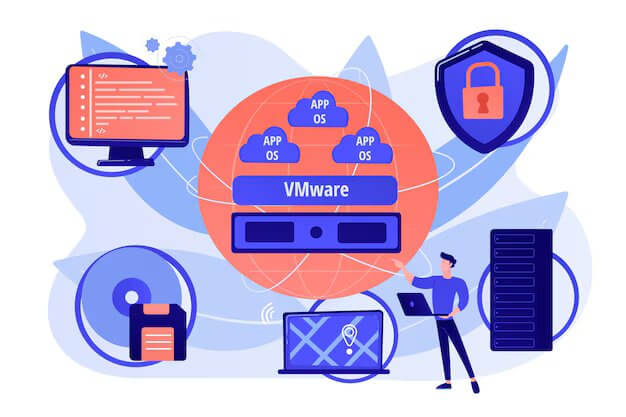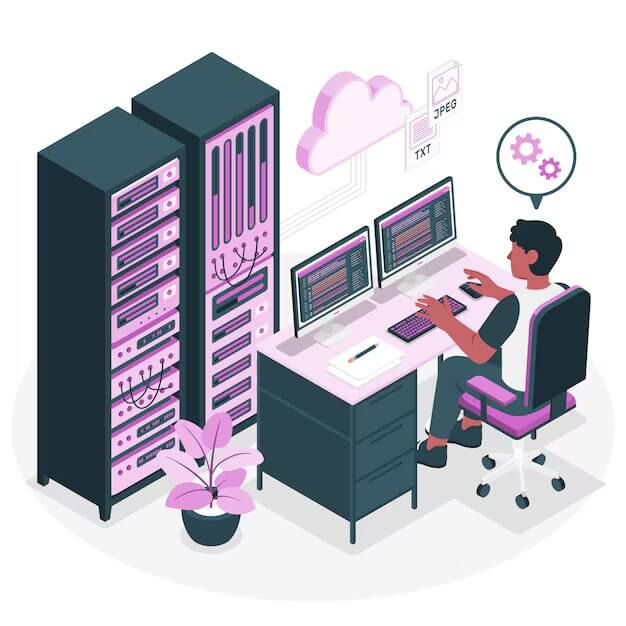VPS vs Dedicated Server

Selecting the ideal web hosting service, whether it's a Virtual Private Server or a dedicated server, plays a vital role in the digital landscape, akin to finding the perfect physical location for a store. This decision impacts your website’s performance, its capacity for growth, and your visibility online. Picture yourself deciding on the ideal foundation for your website’s digital framework.
This decision is pivotal, as it could mean the difference between outstanding online visibility and becoming just another overlooked site on the vast internet. We introduce two robust hosting options: Virtual Private Servers (VPS) and dedicated servers. Each provides distinct benefits that might be the right match depending on your company's requirements, budget, and long-term objectives.
-
- What sets a VPS apart from a Dedicated Server?
- Key differences: VPS with a Dedicated Server
- Pros and Cons of Using VPS Compared to Dedicated Server
- When to Choose a VPS or Dedicated Server
- Summary of Differences: VPS with Dedicated Server
- How can VPSServer help with your Dedicated Server and the VPS you need?
VPS and dedicated servers are vital options that allow businesses to expand their reach, boost security, and customize their online presence to meet changing market needs. This guide will detail the specific features, advantages, and appropriate applications of each hosting type and show you how these technologies improve operations and performance, providing seamless user interactions, few disruptions, and faster processing speeds.
By the end of it, you will have the understanding and assurance needed to choose a hosting solution that meets your strategic objectives. We'll explore the details of VPS and dedicated servers to identify the most suitable option for your business strategy, ensuring you make a knowledgeable decision as you transition your business to the digital space.
What sets a VPS apart from a Dedicated Server?

Choosing the right web hosting, whether a virtual private server or a dedicated server, is as important as picking the suitable physical space for a shop. This decision influences your website's functionality, growth capabilities, online presence, and efficiency.
Within the broad realm of web hosting solutions, two distinct paths stand out for their unique capabilities and advantages: dedicated servers and Virtual Private Servers.
A dedicated server gives you the keys to an entire server, offering unmatched resource access and exclusivity. It is ideal for organizations with high-demand needs. However, this comes at a higher cost and might exceed the requirements of many.
On the other hand, VPS hosting, also known as virtual servers, slices a physical server into multiple efficient virtual environments. This setup, fueled by hardware advancements, delivers a cost-effective way to access dedicated resources, making it a versatile choice for a variety of web hosting needs.
What is a VPS?

A Virtual Private Server functions as an exclusive segment within a larger server, earmarked through server virtualization to provide dedicated resources like RAM, CPU, and storage to a single user. Operating independently of its operating system, a VPS hosting ensures a balance of control, customization, and flexibility, akin to having a dedicated server but at a more economical price point.
It's designed for scalability, allowing for resource adjustments within the server's overall capabilities. It offers a unique compromise between shared and dedicated hosting, providing dedicated resources without the high costs associated with owning a physical server.
It's similar to having your apartment in a larger complex. You own your space outright but share common areas with others, enjoying the benefits of ownership without the responsibility of looking after the whole property.
How a Virtual Private Server works

Virtual Private Servers operate through virtualization technology. A software layer known as a hypervisor divides a single physical server into multiple separate virtual machines. This layer meticulously manages and assigns resources like RAM and CPU to each virtual machine (VM), ensuring they operate independently within the same physical infrastructure without interference.
This structure allows for efficient utilization of server resources, providing each VPS with dedicated allocations. Thus, VPSs combine the benefits of dedicated resources with the efficiency and scalability of shared hosting environments.
Examining specific virtualization technologies like KVM or VMware provides insight into how virtual environments are created and managed, deepening the understanding of VPS operations. Setting up a VPS involves selecting the desired operating system and configuring resource allocations based on needs, which can often be done through a web-based control panel provided by hosting services.
The advantages of VPS over traditional hosting lie in its scalability, ease of resource adjustment, cost-effectiveness, and dedicated server-like features at a lower cost. Real-world applications include hosting websites, running applications, and creating development environments, showcasing its versatility.
What is a Dedicated Server?

With a dedicated server, your website will have an exclusive operating environment for all resources on a physical server, giving you maximum control and root access to customize hardware and software configuration according to your requirements. It would be like owning a private house fully fitted to your needs.
It serves users with heavy-duty needs, offering top-notch performance and security since it doesn't share resources like memory, processing power, or storage. This setup is best suited for websites with lots of traffic or unique technical demands, though it typically costs more than shared options.
However, it is more expensive than VPS hosting due to the exclusive access and extensive customization capabilities.
How a Dedicated Server Works

A dedicated server is a standalone physical unit dedicated solely to your digital operations. It encompasses exclusive RAM, storage, and network setups tailored to your specific requirements. Due to your exclusive rights over the physical infrastructure, this arrangement grants you total control over the server's hardware setup, ensuring that all the server's resources are reserved for your applications and services.
This level of control and dedication is ideal for businesses with high-performance needs, requiring extensive customization and full resource utilization without sharing with others.
Deepening one's understanding of dedicated servers requires exploring the server's OS choices, hardware specifics like CPU types, memory size, storage solutions, network capabilities, and options for boosting efficiency. It is also fundamental to grasp the integration of dedicated servers within broader network setups, including VLANs, security systems, and traffic management tools.
Skill in these technical areas, along with performing updates, managing patches, and executing regular data backups, is vital for maintaining server health and security. To fully leverage the capabilities of dedicated servers, it is advisable to engage with a provider for detailed technical support and guidance.
Key differences: VPS with a Dedicated Server

When selecting between VPS and a dedicated server, multiple users may find the scalability and flexibility of VPS hosting to match their needs. In contrast, others might prioritize the resources and exclusivity of dedicated servers. These factors greatly influence business scalability, user interaction quality, financial planning, and information safety.
Understanding these factors is crucial for selecting the proper server setup that meets specific business requirements and goals, ensuring the infrastructure aligns with both current needs and future expansion.
Flexibility and Configuration
Flexibility in hosting services, whether through a VPS or a dedicated server, is vital for easily customizing settings and system configurations. This flexibility is essential for swiftly adapting to new business needs or evolving customer requirements.
VPS hosting, based on a virtual server model, allows for significant adaptability. Users can modify their virtual space independently of others on the same server, making VPS an appealing choice for companies needing rapid scaling or operational modifications free from physical hardware restrictions.
In contrast, dedicated servers provide the ultimate flexibility in terms of software and hardware modifications. Having complete control over the entire server, users can implement custom configurations and install specialized software that a VPS might not support. This is particularly advantageous for companies with specific, resource-intensive requirements that go beyond standard hosting needs.
Scalability of Resources
Scalability is the capacity of a server to efficiently expand or contract its resources—like CPU, RAM, and storage—to meet changing demands. VPS servers are built to scale effectively within a shared physical setup. This means you can increase or decrease your resource allocation (like computing power and storage) based on your site's traffic without significant downtime.
Dedicated servers also offer scalability, particularly with high-availability setups where multiple servers are used to ensure continuous service. However, scaling on a dedicated server often involves physical upgrades, which might not be as swift as adjusting virtual resources on a VPS hosting.

Performance Considerations
Performance measures the server's ability to process tasks and manage web traffic smoothly. Dedicated servers, which allocate all resources exclusively to one user, generally offer superior power and can manage larger volumes of traffic and data, ideal for busy websites and significant applications. This exclusive resource access ensures that performance remains stable and unaffected by other users, a common issue in shared hosting.
Although VPS hosting may not match the raw power of dedicated servers, it still delivers robust performance for medium to large sites that don't need a dedicated server's full capability. Modern technologies like NVMe SSDs and advanced CPUs enhance VPS performance, providing a cost-efficient alternative for many companies.
Cost Efficiency
Cost is a significant consideration in web hosting. VPS hosting is often more budget-friendly than dedicated server hosting, as it shares a physical server's substantial resources among multiple users, spreading out the costs. This setup is ideal for small—to medium-sized businesses or startups needing more than shared hosting but are not ready to invest in a dedicated server.
Dedicated servers, though costlier, offer more significant resources and power, making the expense worthwhile for businesses requiring maximum control and performance. Investing in a dedicated server typically indicates a long-term strategy to support a solid online presence.
Security Features
Security is crucial in any hosting setup. VPS hosting provides a degree of separation from other virtual machines on the same server, enhancing data and operational security against others' activities. Yet, shared physical server risks remain if other users are compromised.
Dedicated servers deliver superior security by not sharing physical resources, minimizing the risk of cross-contamination, and allowing for advanced security implementations like custom firewalls and anti-DDoS measures. For companies dealing with sensitive information, this high level of security is often essential.
Pros and Cons of Using VPS Compared to Dedicated Server
VPS vs Dedicated Server
| Aspect | VPS | Dedicated Server |
|---|---|---|
| Setup Efficiency | Quick setup, often ready in moments. | Setup can take hours to days for customization. |
| Performance & Reliability | Subject to variable performance due to shared resources. | Top-tier, uninterrupted service with dedicated resources. |
| Customization & Security | Limited customization within shared hardware constraints; isolation doesn't fully shield from threats. | Full customization freedom; enhanced security due to exclusive server use. |
| Cost Considerations | More affordable due to shared resources; potential for increased costs with scaling. | Higher initial costs; potentially more cost-effective for large-scale needs without the need for frequent scaling. |
| Technical Requirements | Requires some technical skills for management, with a risk of overcrowding. | Demands deeper technical knowledge for maintenance; single point of failure can cause significant interruptions. |
Evaluating VPS against a dedicated server involves assessing its benefits and drawbacks. VPS hosting stands out for its cost-efficiency, flexibility, and ability to scale.
It is ideally suited for enterprises in the growth phase or those experiencing varying levels of traffic.
Conversely, a dedicated server stands out for offering absolute control, superior performance, and enhanced security. It is suitable for websites with heavy resource demands but comes with a higher price tag.
Grasping the advantages and disadvantages is crucial for choosing a hosting option that fits your unique requirements, focusing on elements like cost efficiency, ability to scale, system performance, and data protection.
VPS
| Pro Aspect | Pro | Con Aspect | Con |
|---|---|---|---|
| Efficient Setup | Quick, easy setup. | Technical Expertise Required | Requires technical skills. |
| Customization | Server customization options. | Vulnerability to Hardware Malfunctions | Risk of server issues. |
| Affordability | Cost-saving due to shared resources. | Resource Limitations | Limited scalability. |
| Adaptability | Easy resource adjustments. | Security Risks | Vulnerable to breaches. |
| Isolation | Stable performance, less interference. | Overcrowding | Can reduce efficiency. |
| Variable Performance | Inconsistent outcomes. |
Pro:
Efficient Setup: Quick and straightforward setup process with most providers, often ready in moments.
Customization: Provides options for server customization within the constraints of shared hardware.
Affordability: VPS hosting offers a cost-saving solution due to shared resources among users.
Adaptability: Allows for easy adjustments in resources like storage and processing to meet varying demands.
Isolation: Ensures separation from other users on the server, maintaining stable performance without interference.

Cons:
Technical expertise required: Managing a VPS demands technical skills, which could be daunting for novices.
Vulnerability to hardware malfunctions: VPS users share the risk of physical server issues.
Resource limitations: VPS users have the option to scale up their segment, yet the physical server's overall capabilities bind them.
Security risks: Isolation doesn't fully shield from threats that might breach the hypervisor.
Overcrowding: Providers might allocate more users than the server's capacity can handle, diminishing its efficiency.
Variable performance: The configuration disparity across VPS offerings can lead to inconsistent performance outcomes.
Dedicated Servers
| Pro Aspect | Pro | Con Aspect | Con |
|---|---|---|---|
| Security | Minimizes data breach risks with exclusive use. | Maintenance | Requires technical knowledge for upgrades and backups. |
| Performance | Uninterrupted service with dedicated resources. | Single Point of Failure | Service interruptions possible if issues arise. |
| Customization | Full environment personalization possible. | Expenses | Higher costs due to exclusive resource access. |
| Hardware Solutions | Custom hardware fitting for business needs. | Resource Utilization | Possible overspending on unneeded features. |
| Reliability | No shared resource impacts on performance. | Deployment | Takes hours to days due to specific setups. |
| Reputation | Enhances security image with unique IPs. | Scaling | Complexity and downtime when increasing hardware. |
Pro:
Enhanced Security: Exclusive use of the server significantly minimizes data breach risks.
Outstanding Performance: Sole user resource allocation in a dedicated server ensures top-tier, uninterrupted service.
Complete Customization Freedom: Unlike VPS, this option allows you to fully personalize the server's environment, including software and security settings.
Custom Hardware Solutions: This feature allows users to custom-fit hardware according to business requirements, which is not available with VPS.
Steadfast Reliability: The absence of shared resources eliminates the potential for others' issues to impact your server's performance.
Improved Reputation: Allocates unique IP addresses, aiding in SSL certificate acquisition and upholding a secure, reliable image.

Cons:
Maintenance responsibilities: Users must handle software upgrades, security patches, and data backups, which requires more profound technical knowledge.
Single point of failure: A dedicated server's critical drawback is its reliance on a single system for operation, lacking an automatic fallback if a malfunction occurs. This can cause service interruptions and necessitates hands-on troubleshooting to address any problems.
Elevated expenses: Dedicated server unique access to hardware and resources results in higher costs compared to VPS options.
Inefficient resource utilization: When the capacity of a dedicated server is fully used, the budget and resources are effectively used, with excessive spending on unneeded capabilities.
Deployment speed: Initializing a dedicated server requires several hours to days as the provider tailors the hardware and operating system to meet the client user's specific requirements.
Complex scaling: Increasing hardware on a dedicated server, such as RAM or storage, often leads to downtime and involves more steps than the simple virtual adjustments possible with a VPS.
When to Choose a VPS or Dedicated Server
Choosing the right web hosting for your business, be it a VPS or a dedicated server, is custom-made based on your budget, security requirements, and anticipated website traffic.
Opting for a Dedicated Server
Dedicated servers are high-end hosting solutions perfect for large businesses or websites with heavy traffic that need significant resources consistently.
Ideal Scenarios:
Significant Resource Demands: Businesses engaged in resource-intensive activities like big data analysis, machine learning, or extensive e-commerce platforms benefit from the robust processing power, memory, and storage of a dedicated server.
Heightened Security Needs: For entities managing confidential data, such as in the financial or healthcare sectors, dedicated servers enhance security with options for custom firewalls, DDoS defense, and adherence to protocols like HIPAA or PCI-DSS to safeguard information.
Specific Software and Hardware Requirements: For those needing particular operating systems or specific hardware or software setups, a dedicated server allows the customization and root access necessary to tailor the server environment to precise specifications.
Benefits:
Complete Control: You have full control over the server’s configurations and are not affected by other users' resource usage, giving you stability and peace of mind.
High Performance and Availability: With all resources exclusively allocated to your website or application, a dedicated server eliminates the 'noisy neighbor' effect and ensures consistently high performance and uptime.
Scaling to Meet High Demand: Dedicated servers may be less flexible in scaling compared to VPS, but they can support significant traffic increases effectively and dependably with top-tier hardware upgrades.
Choosing a Virtual Private Server:
A Virtual Private Server offers an economical and flexible solution for small to medium businesses, startups, and personal sites that need more resources than shared hosting provides yet do not require a dedicated server's investment. VPS hosting divides a physical server into several virtual ones, each separate from the next, ensuring a good mix of affordability, performance, and autonomy.
Ideal Use Cases:
Growing SMBs and Startups: VPS hosting will benefit companies with growing online operations that require significant uptime, improved security, and better performance than shared hosting can provide.
Development and Test Environments: Developers looking for stable environments for application development and testing can use VPS to simulate server environments without the high costs.
Responsive Web Platforms: Websites that see occasional increases in visitor numbers, like those for holiday sales or special promotions, can benefit from the flexible capacity of a VPS to handle these fluctuations smoothly.
Advantages:
Cost-Effectiveness: A VPS offers several benefits similar to those of a dedicated server but is more economical because it shares physical hardware with other virtual environments while preserving a segregated, secure space.
Adaptability and Versatility: With a VPS, it's easier and faster to modify resource allocations compared to a dedicated server. This flexibility lets companies adjust their resource needs according to their operational demands, minimizing any interruptions.
Administrative Control: VPS users enjoy root access to their environment, which allows for extensive software installations and environment adjustments without the restrictions typically imposed by shared hosting.

Summary of Differences: VPS with Dedicated Server
Choosing a Virtual Private Server (VPS) or a dedicated server is vital for companies aiming to enhance their online presence. VPS provides a cost-effective option, delivering essential resources like RAM, CPU, and storage space within a segmented physical server.
This choice blends elements of both shared and dedicated hosting, appealing to organizations in search of a middle ground regarding management freedom, tailoring options, and affordability. It’s designed to flexibly scale and adjust resources, meeting the evolving needs and demands of a business without the substantial investment required for a dedicated server.
In contrast, dedicated server delivers superior performance, security, and complete control. They dedicate all physical server resources to a single client. This setup is best suited for larger companies or sites experiencing high traffic, which demand comprehensive resource use and specific setups.
Though more costly, dedicated server offer notable benefits, including dependability, extensive customization, and exclusive resource use. They also guarantee peak operation and security levels.
The choice between utilizing a VPS or a dedicated server depends significantly on a company's particular requirements, financial plan, and long-term objectives. Each provides unique advantages for varying web hosting needs.

How can VPSServer help with your Dedicated Server and the VPS you need?
VPSServer.com offers a variety of server plans, each optimized for specific tasks, to cater to a diverse range of computing needs. The available options are powered by fast memory, modern CPUs like the 2.7 GHz Intel Xeon Skylake processors, and NvME SSDs, ensuring high performance across the board.
The Type A servers are designed for availability, perfect for applications that need to be online 24/7 without constantly needing high-speed performance. Type B servers serve as general-purpose machines, offering versatility to handle a broad spectrum of jobs efficiently. For more demanding tasks that require significant CPU power and dedicated resources, the Type D servers are the go-to option. Meanwhile, Type T servers provide flexibility with burstable resources, ideal for scenarios where computational needs spike intermittently, allowing users to pay more only when exceeding a certain threshold.
This nuanced approach to server specialization means VPSServer.com can accommodate everything from always-on services to flexible, on-demand performance boosts, catering to varied requirements with precision. This customization ensures that whether a project needs constant availability without the need for peak performance or a server that can handle intense computational tasks, there's a tailored solution available.
Furthermore, VPSServer.com encourages potential users who need clarification on which server type best suits their needs to contact their sales team directly via telephone. This direct line of communication aims to aid the customer in making the right decisions and, in the process, ensure that he or she chooses a perfect plan for the server that will fit his or her case.
Frequently Asked Questions
What makes the essential difference between VPS and a Dedicated Server?
The major difference coming in between dedicated server hosting and VPS hosting is the sharing and administration of the resources of the server. VPS hosting partitions one physical server into many separate virtual environments. This allows the sharing of the physical resources of a single server by many users, all of whom can have their own wholly isolated and individual private virtual environment. This arrangement offers cost savings and adaptability, making VPS an economical choice. On the other hand, dedicated server hosting dedicates all server resources to one user, ensuring exclusive access and maximum performance. This is preferable for intensive applications that demand substantial resources but typically involves a higher expense.
What advantages does a VPS offer?
Choosing a Virtual Private Server provides several advantages:
Cost efficiency: VPS offers most of the features and performance that you would get from a dedicated server at a fragmentary cost.
Scalability: It includes things like RAM, CPU, and storage, which can be scaled up or down easily; hence, businesses are set in an ideal position to adjust to demand without plowing in much investment.
Customization: Users are offered root access and can fully customize their OS and software stack to exactly meet their needs, much like it happens on a dedicated server.
Management Simplicity: Many VPS providers offer managed services which help users handle backend operations, software updates, and security patches.
How does a VPS work?
A VPS works by using virtualization technology to divide a single physical server into multiple independent virtual machines. Each VM operates independently with its own operating system, resources, and applications. This is achieved through a hypervisor that allocates resources dynamically and ensures that the activities on one VM do not affect others on the same server. This structure kind of combines the privacy and resource allocation of the dedicated servers with the cost and resource effectiveness of shared hosting.
What defines a dedicated server?
On the other hand, the dedicated server is a server that is wholly provided to a single tenant and has exclusive hardware resources. While VPS entails several virtual servers that are hosted on one physical hardware server, the dedicated server, on the other hand, is hosting only one user—its CPU, RAM, storage, and networking capabilities are meant for that user.
This configuration provides maximum performance, high security, and, with its tremendous flexibility for customization, is most appropriate for high-traffic websites, enterprise-level large scale applications, or any operation that dictates a great deal of control over the hosting environment.
How is a dedicated server set up?
A dedicated server is the setting up of a physical machine configured to specific user requirements. It concerns the choice of type of processor, quantity of RAM, type of storage (HDD or SSD, including such configurations as NVMe SSD in case of high-speed requirements), and operating system.
This may also include setting configuration of the network, securing of protocols such as firewalls and encryption, and installation of necessary software applications. Configuration can be customized to offer optimization of performance for specific tasks such that all resources are tuned to support the operational needs of the user effectively.
So, what exactly is the difference when comparing VPS to a dedicated server?
In the comparison of VPS hosting and dedicated server hosting, there quite a number of key factors that come into place.
Flexibility and Scalability: With VPS, you can have better flexibility in scaling resources quickly as your business needs scale up. On a dedicated server, many times scaling means physical hardware scaling.
Cost: VPS hosting generally offers a more cost-effective approach, especially for businesses that do not require all the resources of a dedicated server.
Performance: Usually, the dedicated servers offer better performance, since they provide to the user the total allotment of the server's resources—something very salient for applications that require a great amount of resource.
Security: Both are highly secured in common practice, though dedicated servers guarantee a immense level of security, as there is no sharing of the physical hardware.
What are the pros and cons of using a VPS compared to a dedicated host?
VPS Hosting:
Pros: Cost-effective; scalable; sufficient for most small to medium-sized websites; offers better control than shared hosting.
Cons: Resources are still somewhat limited compared to dedicated servers; potential for resource contention if not properly managed.
Dedicated Hosting:
Pros: Provides maximum performance, security, and control; ideal for resource-intensive applications.
Cons: More expensive; less flexibility in resource allocation without physical upgrades.
When would you use a dedicated server, then, rather than a VPS?
When business operations reach a level where maximum performance, security, and control are needed, one should go for a dedicated server instead of a VPS. This is particularly important for businesses processing large volumes of data and needing to have complex and custom setups, really to meet strict regulatory standards. Conversely, VPS is best suited for businesses that are looking for a middle ground between performance, cost, and most importantly, scalability, which may grow or be of variable demand.
How can VPSServer.com assist with dedicated hosting and VPS needs?
On the VPSServer.com website, they offer dedicated hosting and VPS to suffice under different classes of business needs. Every hosting solution at VPSServer.com is powered by modern CPUs and NVMe SSD storage, designed to support any need, from the constant availability required by small business to large enterprises needing a resource that pushes high demand. They also offer customers facilities in customizations, powerful technical support, and the highest level of security features to make sure that every business is able to find hosting according to its specific needs of growth strategies.









.png)

